
Donate to Innerviews
Since 1994, Innerviews has provided uncompromising, in-depth interviews with musicians across every genre imaginable. And it does that with no trackers, cookies, clickbait, or advertising.
Your donations are welcome to help continue its mission of highlighting incredible music and artists, without any commercial considerations.
Your contributions will be instantly transformed into stories and videos, and cover hosting and web management costs. Importantly, your dollars will help ensure Innerviews remains absolutely free to all visitors, independent of their ability to financially support it.
Please consider making a donation today by using the PayPal QR code below.

Don Li
Graphic Music
by Anil Prasad
Copyright © 2018 Anil Prasad.
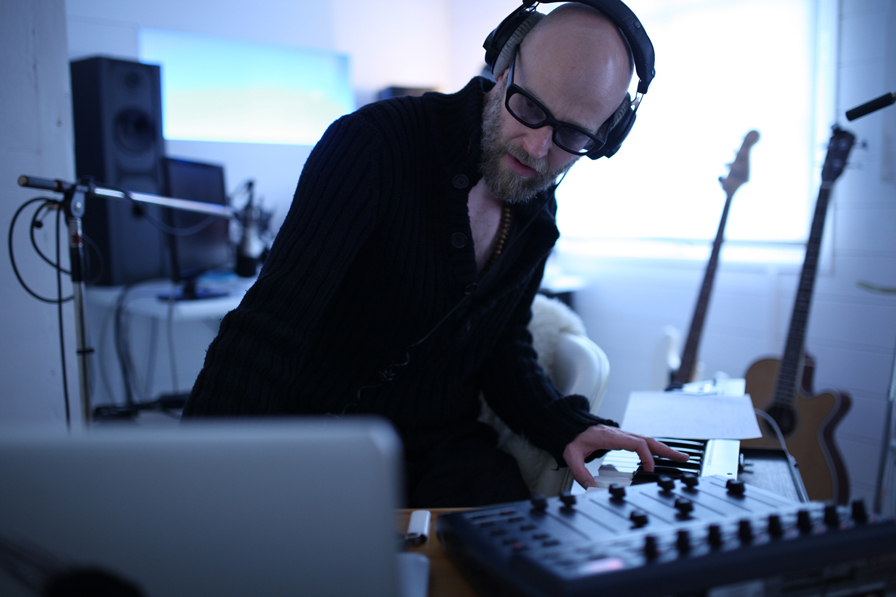
Take a two-minute stroll around the corner from Albert Einstein’s former Kramgasse Street residence in the historic city center of Bern, Switzerland, and you’ll encounter two dark metal doors on the street. The words “Orbital Garden” in small white type on the wall next to the right door are the only indicator that something different from Bern’s typical underground shops resides underneath.
Open those doors and you'll find a non-profit arts and culture space belonging to Swiss composer, saxophonist, clarinetist, and producer Don Li. It was first established in 2000 as the Tonus Music Laboratory and renamed Orbital Garden in 2012. The venue is an extension of Li’s worldview that art belongs to the people and should be democratically available regardless of anyone’s financial means.
While the cityscape above Orbital Garden is ornate, reflecting its medieval provenance, the venue exists in sharp contrast, with a sleek and modern aesthetic. It offers a monochromatic white, gray and black palette. Sometimes globes and geometric shapes hang from the ceiling, accentuated by subtle lighting effects. The space uses every square inch strategically. The stairs leading down to the stage double as seating. Audience members are free to sit or stand anywhere they please. The stage can be as austere as one light and one chair, if there’s a solo musician performing. It can also be a complex multimedia environment, with large groups of musicians, screens, projections, sculptures, and elaborate lighting production. Its downward sloping design ensures the stage, the musicians, and most importantly, the music all remain at the center of attention.

Li has no use for labels or genres. His music resides in uncategorizable territory somewhere between minimalism, jazz, funk, art rock, and electronica. It’s typically pattern-based and often explores a unique concept called curved rhythms. The latter is Li’s perspective on metric modulation in which the music’s tempo and subdivisions result from pre-conceived note values known to the musicians ahead of a change. Li’s curved rhythms involve time signature shifts so seamless that they’re often imperceptible to the listener. They’re at the core of one of his most highly-regarded albums, 2006’s Out of Body Experience, recorded with drummer Fabian Kuratli and bassist Wolfgang Zwiauer.
Since the early 2000s, Switzerland has been celebrated as a focal point for what is often referred to as the “minimalist groove” scene. Li’s work is a key influence on this community of musicians including Nik Bärtsch, Ania Losinger, Björn Meyer, Andi Pupato, Kaspar Rast, Marco Repetto, Sha, and Sonar, just to name a few. All of them at one point have performed and recorded with Li.
Tonus Music Records, Li’s independent label founded in 1999, has released more than 40 recordings to date, including 11 of his own. The majority of those albums were recorded in Orbital Garden, which also serves as a studio environment.
Today, his compositions are uniformly 60-minutes long, comprised of serially-numbered “parts.” These pieces typically focus on a single approach. When a new part emerges, it usually involves a pattern shift. Li considers the parts similar to interrelated haikus or musical sculptures.
Innerviews traveled to Bern to meet Li. We spent a great deal of time at Orbital Garden exploring its origins and underpinnings, before decamping to a nearby café where we dug deep into his fascinating and complex musical parameters and philosophies.
Li cuts a slim, elegant pose today, dressed in a gray wool jacket, black sweater with beaded necklace, and thick-rimmed glasses. He’s an extremely contemplative interview subject, frequently pausing to consider his thoughts and express them in exacting fashion. His answers often transcend music and explore larger worldviews. The conversation often danced around the edges of existentialism and what it means to be an artist that contributes positively to the evolution of our species.
You don’t look at music with any sense of genre or dogmatic perspective. Describe the overall philosophy you bring to your work as a composer.
I think the main answer to this is that since I was a kid, I was never mainly inspired by music. I’ve always been more interested in art and architecture. I think that’s the reason I have no borders or interests in any styles or specific kinds of music. Another reason is I was brought up with classical music. My father was a classical music teacher and that was a difficult situation because that music was kind of holy in our house. I was forced to find an entrance into music through another door. I found that entrance through graphic design. My ears were very big, but learning an instrument was very difficult because my father felt there was a certain way to do that. He was very rough and strong in this regard.
I think this is why I turned to my own language of music, which I see more as structures, architecture, shapes, and shadows. Those are what I understand as parts of music. It was always very strange for me to listen to a pop song. I might find it delightful and interesting, but I could never understand why one part changes to another. I always asked myself “Why did they do that? It’s like building a nice house next to another one before the first one is finished.”
Before I was 10, I wasn’t interested in music. At around 10, jazz arrived through my older brothers and uncles. I understood the freedom of improvisation. It was the opposite of what my father taught us. In jazz, you’re free to do whatever you want and rhythm is important. The holy element was gone. It was very freeing for me to experience this music when I was young. I began playing the piano and drums for myself every day. I never saw it as practicing. But my father would come in, close the piano and say “No, either you learn this instrument properly or you just let it be.” Of course, today, I listen to all kinds of music, including classical and pop music. I rarely listen to conceptual, minimalist music, though. I studied it, but I prefer to be inspired by graphic design or an art book instead.
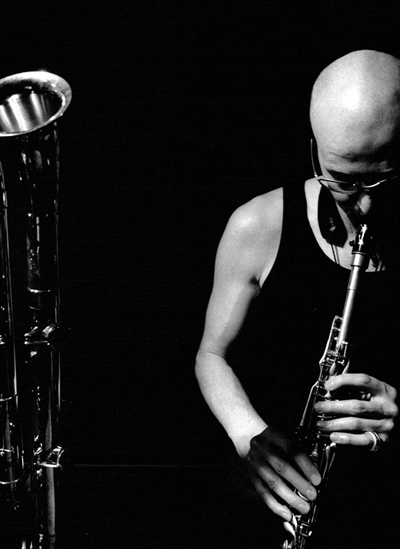
Your earliest recordings from the mid-to-late ‘90s already revealed a genre-less intentionality and fluidity. How do you look back at that work?
At the start, I felt I had to prove I was able to play difficult things and fast lines—the usual thing men feel they have to do to impress one another. You can hear that on the earliest recordings. Some of those compositions I can still call my music today, but the direction was intentionally focused on finding uneven rhythms and complex metrics. I don’t do that anymore. I don’t feel it’s necessary. I feel I’ve found my own language.
One of my earliest pieces, “Part 19,” has a 6/4 beat. It’s just a pattern with no soloing. It was just a rhythm. It was a very strong decision to make and tell the musicians “This is what we’re going to record.” Back in 1996, I didn’t know anything about Steve Reich or minimalism. People told me afterwards they heard the connection. I thought “Oh, that’s interesting.”
Gen, my 1999 album, also has no soloing. It’s a 26-minute album of patterns and rhythms. We went into the studio one day, between tours of Austria and Germany. We had a single evening to record and there was no time to repeat parts over and over. So, I very quickly said to the musicians “There’s no soloing today. We’re just playing the compositions and rhythms. That’s all.” The decision was very instinctive. It wasn’t conceptual thinking. It was more like “Please, no solos. Forget about them. You can play those at the concert tomorrow, but not on this recording.” And that instinctive moment influenced my work and many others afterwards.
After the minimalist artist comparisons were made, you did go and listen to the classic composers of the form, including Steve Reich, Terry Riley and Philip Glass. What was your response to that music?
It was at that point when I discovered Reich’s “Music for 18 Musicians” and many of his other pieces. Of course, I was blown away. I also found Riley very interesting. I never connected to Glass’ work though, not then or today. But Reich’s music touched me very early and strongly. I was really able to understand and feel his musical wishes immediately. I thought “Wow, that’s exactly what I like.” But for me, there was still something missing in his music.
The most significant difference between the music of Reich and what I was looking for then, right up until today, is the concept of how to treat the truth. This is very difficult to describe. Reich comes from the classical world and you can feel that in the way he plays and how he and his ensemble use their bodies when they play. There’s a stiffness to it. Phrasing is not part of his music. There’s no phrasing at all. It’s about being exact. With my music, the thought is to let things be and not have the music be too influenced by my personal story. That means the only thing left In the rhythms is the phrasing. It becomes a question of how you play something and what you put into the weight of the rhythms. I’m always asking myself “How can I play this pattern a little bit differently in a very minimalist, sub-level way?” I miss that idea in Reich’s music.
It’s interesting that Reich was influenced by Elvin Jones and John Coltrane. Reich mentions that in his autobiography. But I don’t ever hear Reich talking about Jones’ phrasing, which is the most important part of what Jones did. Jones didn’t put the notes in exact places. Everything happened in the phrasing. Using the drums and backbeat are very important to me as it relates to phrasing and any minimalist concept I might have. I think the albums Gen and Out of Body Experience from 2006 best exemplify what I mean. You can go from Gen to Out of Body Experience and leave out all the records in between as far as I’m concerned.
Out of Body Experience explores a concept you call “curved rhythms.” Tell me what that means and how it relates to this journey we’re discussing.
It’s clear that rhythm is structured time. You experience time when you listen to rhythm. No further explanation of that is needed. But chronological time is also unbelievably important to us. Before we had watches and measurable time, we would just simply decide that now is the time for whatever we wanted to do. There was a huge range of interpretation of time. It wasn’t precise. There was a much greater possibility to experience time differently. When I’m together with my wife, I feel like time goes faster. When I’m doing heavy, difficult work, I think “Wow, this is taking a long time.” So, time isn’t linear. It’s about perception.
I’ve wondered why nobody tries to work with that idea in music. I’ve tried to invent rhythms that play with timings. I try to play with the perception of speed and tempo of time. When you curve the beat, which I’ll explain, you completely lose the conventional feeling of time.
I’ve worked with 60-minute pieces for the last 16 years. And since I work with curved rhythms, it’s almost impossible to feel the 10-minute or 50-minute mark within a piece. It’s difficult because when the curved rhythms get slower or faster, the idea of inner measurement disappears for the listener. This is a very interesting thing that I look for in music—the losing of form, the losing of the one, the losing of the beginning, the losing of the ending, and losing touch with reality. Those reflect the idea of curved rhythms. It’s got nothing to do with finding complicated rhythms, but rather finding a language that makes it possible to lose all of these connections that hold people in reality.
One of the things I did was combine triplets, binary rhythms and 16th notes. It’s such a simple concept. You’ll even hear it in some children’s songs, but never in a way in which you notice a change of feeling. In jazz, things are typically within the same rhythm at the same time. But there’s something in between the 16th notes and triplets. The instinct is to have two different time feelings coexist in layers, so the speed goes down and up and down and up. It can work within distinct time with five notes, three notes or seven notes per beat. You can have all the timing relate to one beat. That’s what I do with curved rhythms. As far as I know, nobody else has done this before, but it seems so obvious to me to play with this.
The actuality is nothing is straight. Straightness is an illusion in every field. The business world tells you as you get older, you’ll have more success, money, possibilities, and power. Real life never works like this. It’s just a concept of the financial world. Everything is supposed to get bigger and bigger, and so many people believe it, but it’s not true. If I look at my own life, I’m still working very hard, just like I was when I was 25. People in their 40s like me often see things falling apart and going down. And they get surprised when suddenly everything changes. As for me, I love this concept of having everything changing all the time. One day, you’re suddenly standing in front of a huge gap in front of you and there’s nothing there. You think to yourself “I built my life up to this point and now everything has disappeared.” That’s the philosophical concept of curved rhythms. Things build up and this special feeling emerges and there’s this power that keeps coming and then it’s gone. It’s all waves.
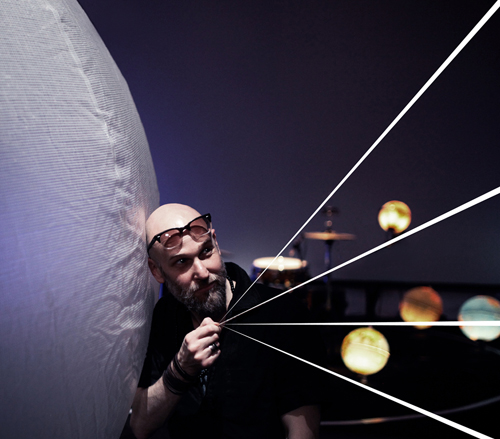
Does this relate to the concept of negative space?
Exactly. I don't work with harmonic concepts. I swapped harmonic concepts for rhythmic concepts. Rhythm is what makes things go up and down. It’s the wave-building form. The harmonic element is not important to me, because I’m coming from the visual world. I have very strong visual images when I think about music and composition, but never harmonic concepts or colors. I have scales similar to what you’ll find in Indian classical music.
The partnership you had with drummer Fabian Kuratli on Out of Body Experience was incredible. Describe the process of working with him to make that album happen.
The album represented almost a game between Fabian and me. He said “Write something very complicated. I love that idea. Push me.” So, I wrote the complex rhythms for the compositions and he was able to read them immediately, right from the first rehearsal. The phrasing was the main focus and he was able to instantly work with it all.
We didn’t know anything about Fabian’s illness while making the album. We were on tour playing. We thought “Now, we’re conquering the world. We’re going to travel and play this music.” After we released the album and played a few concerts, Fabian’s back hurt. He went to the doctor and they found out he had a serious condition. He had to reduce his workload and said he would still play with us with some breaks in between. We didn’t know he would die so soon of cancer. Fabian was just an unbelievable drummer.
Tell me about the vision that informs the Tonus Music Records label.
Tonus is a very old word that I don’t use anymore. My label is still called that because it’s left over from the past. It didn’t make sense to change the name. Everything started with my Tonus Sextet and it was the basis for a lot of ideas. I think it’s okay for the label to retain the name. In 2002, the Tonus Sextet was the same band as the one that did Gen. I tried many ideas with this band, including exploring patterns, rhythms and slow changes.
I called it Tonus because there was no other word available. At that point, it was already a big problem for us to play in jazz clubs with this music. We would just play one pattern for 20 minutes with nothing else happening—no soloing, nothing. We didn’t even talk on stage. We just came on stage, played this pattern and left the stage. So, the jazz environment was not the right one for us. It also wasn’t the right audience. Most of the time, they were bored. They were frustrated because no-one was soloing. Some people would say “What the fuck are you doing?” There was no word or explanation for this kind of music. So, I tried to find a word that meant keeping tension and not letting it go. That was the way I viewed my music at that time.
I would roughly say everything on the label has to do with time and emptiness. It’s about a visual way of playing music. It relates again to how graphic design influences me. It could be called graphic music. The music on the label involves graphical instructions and repetition. If I can experience graphical visualizations when I hear the music, then it fits in Orbital Garden and my label.
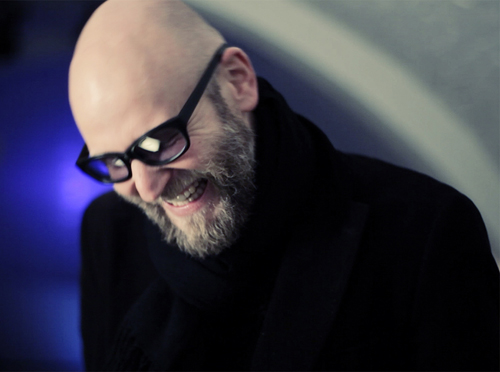
What don’t you want on your label?
Jazz. [laughs] I also don’t want New Music or new classical music. I’m not interested. I do listen to the old jazz masters, but never to new jazz. It bores me. The main word I have to mention is entertainment. I’m not interested at all in entertainment. This also relates to jazz, because I don’t like the entertainment part of that genre. Entertainment is about dilution to me. It’s also about rules. It’s also about storytelling. I’m not offering rules or storytelling. I’m offering space where people can enter, walk around and decide what they want to look at and hear. It’s about experiencing time and space, not a story.
Many aren’t aware that you founded a community of musicians in Switzerland during the early 2000s that went on to have major impacts in the jazz, New Music and minimalism realms. Your ideas reverberate to this day in the country and far beyond. What’s your perspective on your influence during that era?
The ideas from the early Tonus work became normal and conventional. So, I was forced to go further and look for new ideas. I’m very grateful that the ideas became well-known, because it made me go deeper. I’m not interested in establishing a style. I’m more interested in the search. I’m interested in connecting and exchanging ideas with people. All good things have to do with reduction, letting things go and not doing the same things again and again. It’s important that I go forward. At the time of the Tonus Sextet, there were many other people, particularly younger people and students, that tried to sound like what we were doing.
Isn’t that a form of flattery?
If you’re Peter Gabriel, it is. He can say “Yes, people recognize me. They know where these ideas come from.” For him, it’s no problem. But I’m not Gabriel. I have to fight if I want people to have that knowledge. At the time of the Tonus Sextet, it was a problem for me. The musicians had the same tools, instruments and aims as I did. I had to step out of the situation. People were even choosing to look the same way I did. We performed at Tonus Music Laboratory, my venue in Bern, which I renamed Orbital Garden. Many students and musicians started adopting our aesthetic. They would show up with a shaved head and black clothes, just like the band. There was a lifestyle behind it too related to drinking tea, vegetarianism and martial arts. The whole space was crowded with people like this. It was almost like a religion and I hated it. It was scary. I wanted to destroy it, because it started to mean I was searching for security, which is a stupid human pursuit. The universe doesn’t need us to do that. The universe is a safe place. What I wanted is an exchange with musicians. I didn’t want to be someone who says “I found it. Please follow me.” Perhaps that’s a typical Swiss reaction.
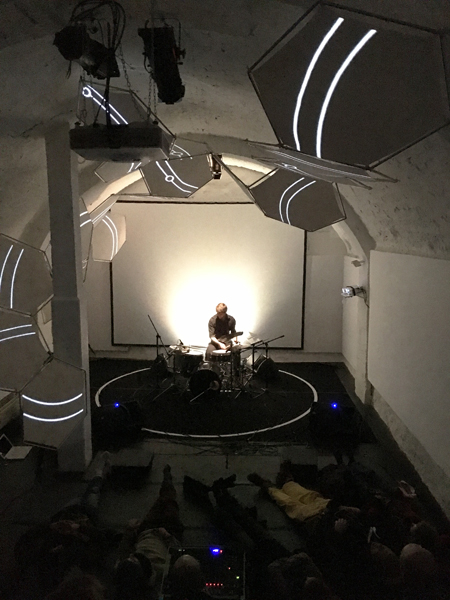
Tell me how Tonus Music Laboratory morphing into Orbital Garden illustrated the transition you sought to make.
In 2002, I gave up on my sextet and decided to exclusively play at Orbital Garden. From that point, I started inviting people to Orbital Garden, and researching new music and ideas. Orbital Garden was a reaction to playing the same things and places with the sextet. Orbital Garden is a space for long-term time and space projects. Time is always included in anything that happens there. It’s designed as a place to experience time, whether that’s through visual art or music. I’m not trying to be dogmatic at all. It’s a room. It’s not a concert hall, gallery or studio. It’s a rocket station for trying new things out. Manuel Pasquinelli, the drummer from Sonar, did a show here where he was playing drums to his own heartbeat. Orbital Garden was a perfect place for him to try this out. Where else could you do this and see what happens? It’s exactly these types of ideas I want to explore. And people either get them or they get bored. They might even fall asleep and that’s okay. Orbital Garden is a place where you can explore super-consequent ideas. I’m providing Bern and the world a space where these subtle things are possible. The outside world is loud. It’s very rough. There’s never any time. People want to get to the so-called point. I don’t know of any other place like Orbital Garden in the world.
Describe the evolution of public support and the model that enables you to operate Orbital Garden.
Things move really slowly in Bern. You have to do things for years until you’re accepted. People can be very critical and say “What is he doing?” before they consider supporting you. It doesn’t happen immediately. They let you hang out for years. So we just did it. We made it happen. I don’t believe it looking back, but I was running Tonus Music Laboratory for almost 10 years, using my own money. As Tonus Music Laboratory, we received no funding. I have no money from my family. I am not rich at all. I mention this because there are people who think I must have a rich family behind me. That’s not true. I was financing the venue through teaching and my compositions. Just after the 10 year mark, I got my first public support from the city of Bern. I was too proud to ask for it. I thought “Hey, I’m doing this. You see what I do. You see how many people walk through this space all the time and are inspired by it.” After 10 years, the city offered to support the space with some money. Ever since, it has been called Orbital Garden.
The financial support isn’t very much. But I have very low rent and it’s a very big advantage to be located in the middle of the city. Today, the city pays the rent and that’s amazing. The rest is financed by people who give us 10 Swiss Francs a month. I now have over 250 members who do that monthly. This is what I refer to as “Orbital Cloud Financing.” Because of this model, we don’t control who comes into the club. We don’t charge an admission fee. It’s free for everyone. I don’t know who in the audience is supporting us financially and who is there for free. I don’t care. I’m very happy people come and are interested in this world. The space is always crowded, even if the music is very minimalist or specific.
On one hand, people are interested as a result of our many years of work, but it’s also because entrance is free. I’m not interested in playing for the same crowd and people. I want to attract people from other fields and convince them about other ideas. So, this model works very well. The cloud financing model keeps getting bigger. More and more people are attracted to this idea. It is growing slowly. If it was New York, Berlin or Zurich, it would be totally different. In Bern, people have to attend 10 times before they think “Maybe I should support it.”
How did you arrive at the name Orbital Garden?
"Orbital" reflects another part of my music. Each piece is one hour. Everything is a cycle. Everything is an orbit. In one hour, we go around all the rhythms and patterns across curving ovals. Things are always rotating. The word "garden" represents the idea that it is growing. I created something and it’s evolving. If we take care of this little plant, it will grow. So visit us and experience one hour of music. Let’s fly around for an hour and see where we go.
Why did you choose a uniform 60-minute length for your compositions?
We have so many possibilities to find solutions for creating art and music. It’s overwhelming, actually. It’s too much. So, I wanted to find a concept and a language to push myself into decisions. For me, the most interesting tool, as we discussed, is losing touch with reality and curving time. I was tired of “playing pieces.” I’m uninterested in five-minute music. I cannot even breathe in and out in that time period within music. I thought “60 minutes is a very good timeframe to work with. It’s very common. Everyone knows this one-hour idea.” It was 16 years ago when I started doing this. I’ve developed a certain ability to feel time in a different way, but at the same time, it’s also a big problem.
I have my own ideas of how music should be. I do have many 10-20 minute ideas. They work well for 10-20 minutes only. I’m not happy about this. They’re too short. It’s easy to make a five-minute composition with very good patterns and interesting rhythms. But the proof comes when you go beyond that. That is when you learn if it’s really interesting or not. Is there enough material to go beyond that? After 20-30 minutes you have transcended design. Now, the music is grabbing you deep and you learn if the structure is really providing something of substance or is just something nice. That’s my own thing. It’s my own proof. I am working on eight new compositions right now, each lasting 60 minutes. I’ve been working on them for 11 years. The eight pieces will be completed at the same time. I don’t know when.
What can you tell me about the new work?
They further examine curved rhythms and the DNA of that concept. I have a certain harmonic and rhythmic pattern behind everything. It’s at the back of the music and everything is related to it. Every note belongs in a certain place. The music is not improvised. It’s not by accident. It’s not composed. It’s about phrasing. These eight compositions all have to prove that they will keep the interest of a listener for 60 minutes. That’s why it is taking so long to finish them. I don’t know when I’ll release them. I will see if they will become a huge box set with everything or be placed with a book.
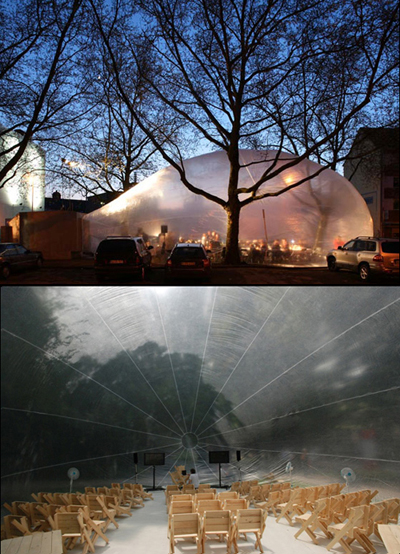
You have a concept for taking Orbital Garden on the road in a very unique way. Tell me about the idea.
It’s a new thing. I don’t play at clubs or jazz festivals any longer because the music I’m making does not fit in that frame anymore. I don’t feel comfortable. Those are not the right places for what I do. I’m very strongly convinced that new ideas need new spaces. It’s very difficult to perform a new musical idea in the same old spaces of the past. As I’ve said, that’s why I’ve only been playing at Orbital Garden for years. It’s quite a hidden space. It’s underground—literally it’s below street level. It’s in a very small town. I’ve specifically chosen this place because of these qualities.
But I need something that enables me to go out and perform as well. It needs to be the opposite of this very hermetic, underground, dark space. To do that, I need to bring my whole environment with me. What I came up with is the idea of the Orbital Garden Traveler. It’s an inflatable concert space. We’re going to build it using a very thin skin made of Cuban Fiber. It’s not plastic. It’s a very strong, super-light material that you can fold into the smallest size possible. A Cuban Fiber shell that’s folded down to one meter by one meter can be 50 meters long, 12 meters wide and five meters high when inflated. It can transform into a huge space. We just fill it with a little bit of air and it will be the size of Orbital Garden. It’s possible to transport this across Europe. We can just set it up anywhere we want to play. It’s the complete opposite of the Orbital Garden fixed space. It walks to the people. We are in the process of building this now. We’ll go to people within a new system. It might not be a perfect one. But it’s an attempt at something new.
You occasionally hold sleep concerts at Orbital Garden. Describe the challenge of performing continuously for seven hours.
Pushing the limits is always very interesting. How do I personally react to the challenge of playing seven hours in a row? How do I blow a horn for seven hours? It’s a very physical experience. The seven-hour concerts aren’t different from the 60-minute concerts in my mind. I can tell you when I arrive at the 60 minute point as I’m playing. But my condition is very different in this context. I will get very tired and almost fall into a kind of LSD-related condition. Decisions get made in a different way. It’s too exhausting to think of a performance as seven hours, so that part of my mind shuts off. My playing becomes very economical. I think about each note I play. It’s similar to a raga. I have to calculate how I treat the notes. How I treat scales and notes is very important during sleep concerts. For instance, if I play a very high note, that note is gone forever when it finishes. That energy won’t repeat again during the concert. It’s a kind of musical tantra. I have to be very careful about which notes I’m using, how long they play and how loud they are. Sometimes, I might feel like I’ve played all the ideas I have at the time in a few hours. So, I have to think about how I can repeat the same notes again, but make them a little higher or lower, or otherwise different, somehow. I have to work with very small changes. It’s one of the things that amazes me about these long-form concerts. I get to have the possibility of going very deep into very small things.
I don't know what listeners are getting out of it and I avoid thinking about it. I’m just offering the space. That’s all I can do. If you enter the space and I tell you “Look at it this way,” the experience is already gone. What I can tell you is that when everyone is asleep, usually by 4am or so, my decisions get made differently. I might think something I previously rehearsed was too rough for people sleeping, so I have to become much more careful. I don’t want the horn to peak out. I want things to be quieter, slow and soft. I don’t want to destroy their sleep.
We have to talk about death and dying when it comes to sleep concerts. I say that because we are in a space where people are losing control. They’re getting tired. They lose the idea of the space they’re in. They have moved away from any idea of “Entertain me.” This is very related, I assume, to the moment when you have to leave the planet. You have let go completely. This part interests me very much.
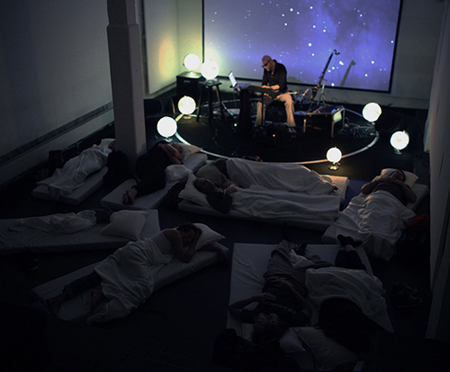
What does death mean to you?
The only thing I can say is that I believe our planet is very much inspired by Buckminster Fuller. The planet is a kind of spaceship. The entrance to the spaceship is our birth and our exit is our death. We are travelling through space. I’m very interested in astronomy. Every night, I look out at the sky with my telescope and it inspires me very much in a spiritual way. I’m interested in the idea that we are in a huge nothing—a huge cosmos turning around 850,000 kilometers an hour around the center of our galaxy. We are also turning around 120,000 kilometers an hour around the sun. And then we are turning 1,700 kilometers an hour on our own axis, every day. There’s a huge space somewhere between the dark matter involved. As soon as I talk about it, it loses its meaning. It would just make it smaller as soon as I talk about it. What I can say is that I know I can play music and work within the possibilities that we have on this planet.
Do you believe music can serve as a catalyst for fundamental change in the world?
That’s a very interesting question. Just look at the U.S. and Donald Trump. We don’t have to go further on that topic. However, the whole system we live in involving politics, finances and religion is based on greed, fear and pain. These systems are never going to work. It’s impossible to have these systems relate to creating meaningful change. So, the only thing we can do is let this whole system subside and independently build something completely new that’s better than the things we have, politically, philosophically, spiritually, and musically. Maybe one day we can push the old things out of the way.
I believe art and music are always the expression of the first new ideas of human beings. New ideas are expressed in art and music faster than in science. I believe music is a critical art form. If we can build something new in music, we can also replace the old systems I discussed. That’s why we should support music. We should give it a lot of attention. The very sad thing is when we integrate music and art into the world of finance and business, we make the music much smaller. As soon as I talk about music and use a system to describe it, I destroy it. In my work, there is no system. I don’t want a system. But I see a big opportunity for music, which is the creating of the roots of a completely new idea that changes perception. And that’s what we need. We need a new perception to realize what we should do next and how crazy we are.
Think about this idea of Trump as the big man of the world. It’s a sign of complete insanity. I can’t believe a single word of politics anymore. I had to step out of it completely. It’s just ridiculous. Again, the only thing we can do is immediately build our own systems. Perhaps we have to create and trade our own money. We’ll barter. We’ll build up a system that’s completely independent from the one they use. It’s the only chance we have.
How realistic an idea do you feel that is?
If I didn’t believe it, I would lock the doors to Orbital Garden. I used this idea at Orbital Garden. I created my own system. No-one is charged an admission fee. So, looking at the U.S., this sort of success is a chance for people to see they can really give up on the old system. It’s a new way of looking at things. It’s a chance for everyone to understand how crazy everything is.
This ill system isn’t going to change anything in a positive way for the world. We have to change it. We have to make distinctions. This is why I have Orbital Garden. I don’t want to travel around in a conventional sense. I don’t want to go around the world and think “I’m so important. I have to spread kerosene around the world and light it on fire because I’m so special.” I really believe we can do a lot and live with much less. That’s true minimalism. That reduction is what interests me. I’m not interested in ego pushing or material pursuit. I suggest to all musicians that they build their own spaces and stay there. Play for your society. Make something happen. There’s no need to be world famous. That’s just an ego play to feel bigger and important. I want to experience love with people I love. It doesn’t matter if I’m in Bern or New York. I don’t give a shit about being important, worldwide. That’s an idea founded in the financial world—that everyone has to be big and important. I don’t care. My goal is to simply participate in the universe for a few seconds with a few notes.